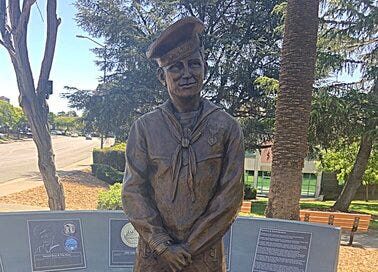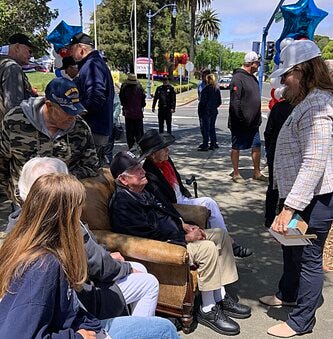Thoughts on Finding a Home—And a Town To Go With It
The two ingredients of a hometown: home and town.
What is a hometown anyway? The place you live now and call home, the place where you grew up, or the place where your heart is?
Some people have managed to achieve a kind of combo pack for hometowns. They love where they live, it’s where they grew up, and they wouldn’t live anywhere else.
They may be the lucky ones, I don’t know. All I know is that it hasn’t been my path.
Such thoughts came to me the other day because since I’ve been writing Tilting West, something unexpected has occurred: I have gotten back in closer touch with the people I knew when I was a boy and the city we all grew up in. It’s been fun.
Despite the fact that I live only an hour or so away, I haven’t been back to Hayward, California in years and years, maybe even a decade. (It’s an omission I plan to rectify—am going back in a couple of weeks to see friends.) Despite this long absence I could still drive there today with nary a peek at my Apple Maps program and take you straight to my old elementary school. Up East Avenue from there is where Bob Schmitz operated his Union 76 station. The Jang family ran the grocery store across the street, East Hills Market. You could find the Larsons on Winchester Court and up at the top of East Avenue was where Mike and Moe Gruber, Mark Lund and the Lauritzens lived, and down in that pocket of homes near the school were the Melvilles and Bakers and Pectors.
And hey, if you’ve got time, I can show you Lone Tree Cemetery and the gorge with the big eucalyptus trees where we built a tree fort as kids and had cherry fights in the cherry orchard there. It’s all gone now, of course, except the cemetery.
Such childhood memories are certainly not unique to me. You’ve got yours; I’ve got mine; we’ve all got ‘em. The people we knew and the experiences we had when we were young are hard-wired into our DNA. They’re like ligaments and joints, they’re part of who we are.
But this is what was going through my mind: Does that then make Hayward my hometown? It’s my old hometown, for sure. But I didn’t choose to live there, my parents did that. Is your hometown defined solely by your past?
When you consider what makes a hometown a hometown, there are two main ingredients: home and town. It’s not just a matter of finding a home that works for you, you’re looking for a town to go with it, just like a hat needs a hook to hang it on the wall. And your feelings about home and town are shaped by variables such as these:
• Length of time spent there.
• The time of life when you were there.
• Friends and associations you made.
• Depth and intensity of your experiences.
• Family, family, family.
• A sense of rootedness and place.
There’s no formula for finding the spot that’s right for you. It’s as individual as you are. A mix of any of these ingredients or even just one or two, if they were deeply felt, could turn an ordinary town into something that sings to you, for life. Just living somewhere for a long time, however, does not necessarily make it your hometown.
I knew a man who was born in County Cork in Ireland and emigrated to the U.S. as an adult. He spoke with a fine Irish brogue and smoked unfiltered Camels. First setting foot in this country on the East Coast, it took him a while before he settled down on the California coast in a small fogbound town that reminded him of the old sod: cool, damp, by the ocean. He married and raised a family and became an American citizen.
But in some ways, in the mysterious ways of the heart, he never left Ireland. Always he spoke about going back to County Cork to live and finish out his days. He never did.
Where the heart is. That’s a big one. It’s hard to see how you can call a place home if your heart has packed its bags and taken up residence at another address.
Can your hometown be a town where you did not spend the glory days of your youth? I think so. I think it can. Today I live in a little city on the Carquinez Street where the Sacramento River spills into San Pablo (and San Francisco) Bay. Most everybody in the Bay Area knows Benicia a little bit because they see the highway sign for it as they’re driving past on Interstate 80 up to Lake Tahoe and the Sierra. It’s been my home for decades. I’ve lived here longer than anywhere else.
We raised three children here. Our second child, Leah, died after only five days in the hospital and she is buried in the town cemetery. We visited her on Memorial Day. The cemetery sits on a hillside overlooking the town and the water and it has been around practically since the founding of Benicia during Gold Rush times. We have friends here who, like us, enjoy the small town ambience of the place.
Earlier this month the city erected a statue honoring a Navy sailor from World War II, Harold Bray, Jr. A group of public spirited citizens came together, raised the money, and got it done. Bray, who attended opening ceremonies for the monument, is a longtime resident and a former cop. In 1945 he was 18 years old and serving on USS Indianapolis, the flagship of the U.S. fleet in the fight against Japan for control of the Pacific. Two enemy torpedoes struck the ship and sunk it, killing 300 sailors. Close to 900 men survived the sinking, only to face terrors nearly as bad: five nights in the open sea hundreds of miles from land, battling wounds and injuries, sharks, dehydration, and more. Only 316 of those men survived; one of them was Bray.
The statue is, fittingly, a happy place, a testament to why Bray and others like him did what they did and what they achieved for us. It’s located in a plaza at a key intersection and has already become a meeting place and prime selfie spot. If you do decide to pull off the interstate and venture into town, be sure to look us up. We’ll give you the tour. It makes me like Benicia even more than I already do.
But even with all this, do I regard Benicia as my hometown? I don’t know. I guess I’m still figuring it out. I’m a Californian. We’re more of a rootless people. We came from somewhere else, many of us, and we may have other places to go still, you never know. That describes me anyhow. I’m not sure I’ve ever felt quite settled, no matter where I’ve lived. It always feels to me as if the next place down the road, the next place I hang my hat—that is where I will find it, that is where I will finally find home.





